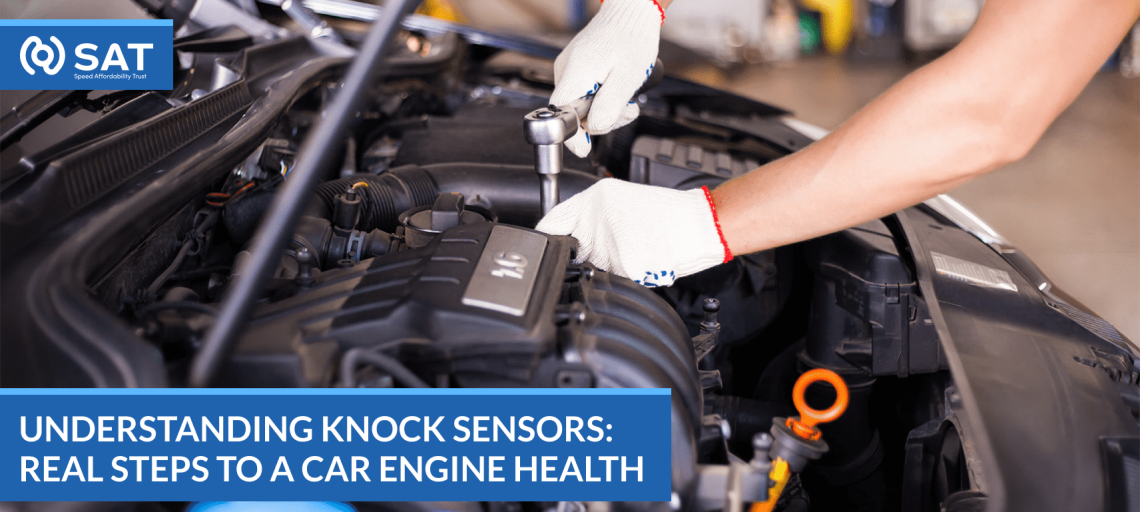While driving, you watch the road ahead, and suddenly, you realize your car engine starts making a weird rattle or loud ping sound. The words “can’t be good” worried me the most. What’s the reason for that strange noise? It can be a clink engine knock that, along with time, gradually destroys your engine. The great news is your car has a built-in feature, the engine knock or knock sensor, that can catch engine knock and prevent your car from damage. In this blog, we’ll explain what causes the knock, how the knock sensor can tell the difference, and how it communicates with your car’s computer to remap the engine properly. Let’s get into this!
What Are Knock Sensors and Why Are They Important
A Knock sensor is a small device in your engine that picks up vibrating and knocking noises. It’s critical because it ensures injection timing and keeps your engine performing properly. When the gasoline is not burning correctly, you have other problems, such as engine damage, reduced performance, and less gas mileage.
It turns these vibrations and sounds from the engine block and cylinder heads into electrical signals, which are then translated into a computerized diagnosis of potential engine problems. They might hear a knock or ping, which tells them that the fuel isn’t burning well.
This hammering may not necessarily destroy your engine today, but it will wear it out every day. Every time the knocking is detected, it emits a signal to your car’s computer, which then shifts the ignition timing accordingly to overcome the problem.
How Knock Sensors Protect Your Engine
Your engine’s performance depends on how precisely the fuel and air it needs are mixed. However, whenever there is an excess of fuel and a lack of air flowing into the engine, it may degrade and generate a knocking or rattling noise. In this situation, sensors may detect the problem and take preemptive actions to save the engine.
Improve Performance
This way, knock sensors let the engine give a repetitive flow or run at an optimal performance. The adaptable ignition timing of the computer is one way it can generate better power for use without the risk of damaging itself. This means that it adds more spirit and fuel efficiency.
Prolong Engine Life
Without control, the engine wear and tear caused by knocking can prolong their life for a short period. Knock sensors prevent further damage by letting the driver know to adjust the engine when even a slight knocking occurs. Which in turn guards the working parts such as the pistons, valves, and cylinder heads thereby prolonging the engine life-span.
Knock sensors, an essential feature in engine protection, belong to a group of parts that allow you to keep your engine in optimal condition. If these things are located, they are ordinary, but they can, though, reflect in the successes of the engines, fuel performance, and longevity of the engine.
If you are driving a car and the check engine light is on because of a damaged knock sensor, do not ignore it and immediately bring the car to the service center or your mechanic to ensure the issue will be fixed soon.
The Warning Sign of a Faulty Knock Sensor and the Right Time to Repair
The sensor that detects the vibration and pinging sounds in your car’s engine determines the correct run timing, ensuring optimal engine work efficiency. The second you start having knock sensor issues, you will likely notice signs suggesting replacement is due.
Engine Noise and Vibration
Suppose the knock and rattle deteriorate and turn into hood-rattling or rattling noise. In that case, it is an obvious sign that knock sensor failure has already happened, and the only thing to do is engage acceleration. Due to a characterizing feature of their inability to perceive engine vibrations properly, this happens. Vibration is enhanced in the steering wheel, seat, and floorboards so that you can feel more vibration.
Check Engine Light
The knock sensor onboard the digital system supervises the sensor functioning perfectly. If any of the sensors are faulty, the “check engine” light will glow on the display monitor. The scanning process will trace knock sensors as the primary problem.
There you have it all! With that information about the knock sensor, you are aware of their methods for ensuring your engine’s performance and mileage stay in good shape. Get more at SAT
Frequently Asked Questions
What is its place in the line of defense of an engine?
A knock sensor is the device that checks for the unusual vibrations in the engine, which are being summed up as engine knock. When ignition vibrations are sensed, the engine control unit is signaled to advance the ignition timing, thus reducing pre-ignition or detonation, which could cause damage and reduce engine life.
What is the knock sensors’ role in improving fuel combustion?
Knock sensors assist in optimizing the combustion process by precisely adjusting ignition timings to existing engine conditions. By sensing knocking and pinging, they prevent engine misfires and fuel wastage, making the engine run more efficiently.
What are those practical steps to avoid knock sensor problems?
To avoid a knock sensor failure on an engine, you must always keep a clean and well-tuned engine. Conducting regular vehicle servicing, choosing the best fuel, and not modifying the engine.

